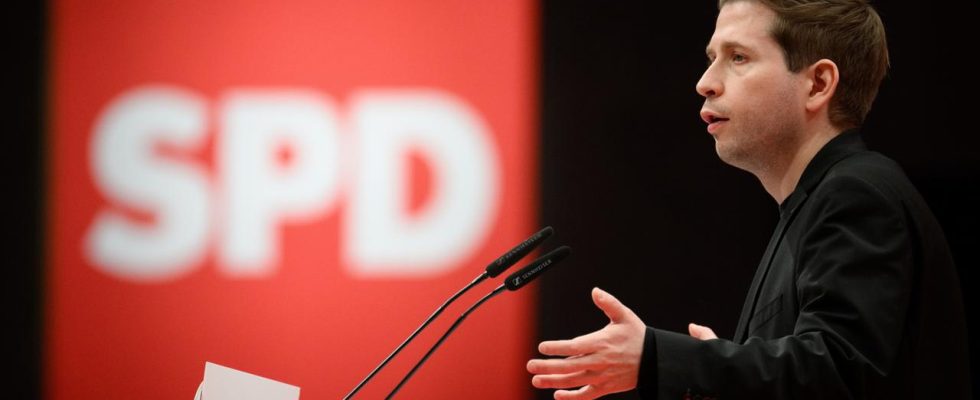analysis
There will be elections this year in three eastern German states. A look at surveys shows that the Chancellor’s party is in danger of losing its importance. How does the SPD want to counter the rise of the AfD?
When the SPD met for the party conference shortly before the end of the year, it had had a tough year: traffic light crisis, poor poll numbers, criticism of the Chancellor. So it’s understandable that the party has decided to leave the big argument at the door over the weekend.
But then Mareike Engel enters the stage. She is 23 years old and head of the SPD youth organization in Saxony. There will be elections there in the fall – and the AfD is currently leading the way. Engel wants to shake up her comrades, turns directly to the Chancellor and accuses him of not doing enough social democratic politics. Boos follow. Angel leaves the stage.
The boos hit her, she says in an interview ARD capital studio. On the other hand, the reaction of some in their party also shows how different realities are perceived.
The SPD no longer plays a role in many places
The elections in the East hover like a dark cloud over political Berlin. The political map in the East has turned blue. Especially in Thuringia and Saxony, the SPD almost no longer plays a role, the AfD dominates. How does the Chancellor’s party want to deal with this?
Kevin Kühnert gets serious when you ask him about the state elections. As SPD general secretary, he is chief strategist and has to organize the election campaign together with the local state associations. And that’s not that easy. The SPD is barely present in the East, as are the CDU, the FDP and the Greens. In small town, village areas The SPD is not particularly well positioned, admits Kühnert. The AfD has an easy time of it, especially here.
Lower wages and inflation
The situation in Brandenburg is different, but also not good for the SPD. The party is still doing much better here than in Saxony, for example – but the AfD leads the ranking.
Why it is like that? Mathias Papendieck is also concerned with this question. He is an SPD member of the Bundestag from Frankfurt an der Oder and is generally satisfied with the results of the SPD-led government in his federal state. He quickly begins to list the most recent successes: the strong economic growth, the settlement of prominent companies such as Tesla and finally the expansion of renewable energies. Brandenburg now produces more green electricity than the country itself needs. Papendieck is firmly convinced that this is the way forward.
And yet his SPD is only in second place in the polls, behind the AfD. Papendieck believes that this is also related to inflation and the still lower wages in East Germany. This is, among other things, the basis for this feeling of not being treated equally, even more than 30 years after the fall of the Berlin Wall.
Economy as the main topic
Feelings have to be taken seriously in politics, explains Kühnert. Many people in the area rightly felt they were not being treated fairly. It is a truism that feelings often count more than facts in politics. What use are the stories of hundreds of wind turbines and large factories installed if no one wants to hear them? It is one of the questions that the SPD leadership is currently pondering.
What is certain is that economic issues should become the focus of the election campaign. Just small culture wars, like discussions about gender-appropriate language. These discussions would literally drive voters to the AfD. Instead, we should talk about secure jobs and fair pay.
East Germans Success stories
Kühnert wants to tell East German success stories in the election campaign. The election campaign must revolve around how more of them could be written. With confidence and a spirit of optimism against the impending shift to the right, that is obviously the motto in the Willy Brandt House.
It is more than questionable whether this strategy will work. The pent-up anger towards “those up there” seems too great. If it stays that way until autumn, even the best campaign will have little chance of being noticed.
Mareike Engel, the head of the SPD youth organization in Saxony, does not seem to have given up hope yet. She wants to fight and expects that many comrades from all over Germany will support her. It remains a risky bet that the SPD in Saxony will recover again. The odds are bad right now.
Torben Ostermann, ARD Berlin, tagesschau, January 3rd, 2024 1:55 p.m

